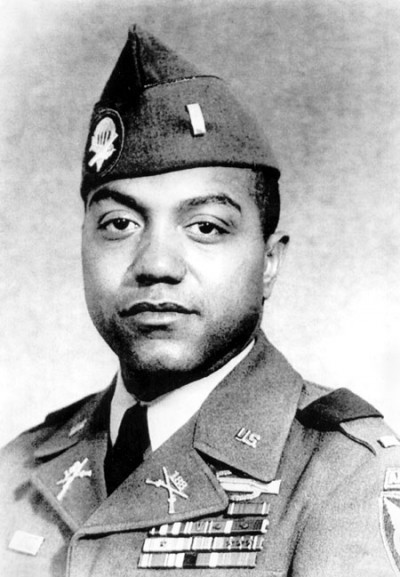Vernon Baker (Vernon Joseph Baker)

Baker was born on December 17, 1919, in Cheyenne, Wyoming, the youngest of three children. After his parents died in a car accident when he was four, he and his two sisters were raised by their grandparents. His grandfather Joseph S. Baker, a railroad worker in Cheyenne, taught him to hunt in order to feed the family and became “the most influential figure in Vernon’s life.” His relationship with his grandmother was much more strained, and he spent a few years at the Boys Town orphanage in Nebraska to be away from her. Baker graduated from high school in his grandfather’s hometown of Clarinda, Iowa. He then worked as a railroad porter, a job he despised, until his grandfather’s death from cancer in 1939. A series of menial jobs followed until his enlistment in the U.S. Army in mid-1941. He attempt to enlist in April 1941, but was turned away with the recruiter stating, “We don’t have any quotas for you people”. Baker tried again weeks later with a different recruiter and was accepted; he requested to become a quartermaster but was assigned instead to the infantry.
Baker entered the Army on June 26, 1941, six months prior to the U.S. entry into World War II. He went through training at Camp Wolters, Texas, and after completing Officer Candidate School was commissioned as a second lieutenant on January 11, 1943. It was at this time that we met Sgt. Coleman Conley, a Tuskegee Airmen pilot, and his brother, Booker Conley. It was Coleman who encouraged Baker to find a way to join the 92nd Infantry Division. In June 1944, Baker was sent to Italy with the all-black 92nd Infantry Division, with Booker Conley joining him that November as part of the 366th Infantry Regiment, which was a part of the 92nd Infantry Division. Baker was wounded in the arm in October of that year, hospitalized near Pisa, and in December rejoined his unit in reserve along the Gothic Line.
In early spring, 1945, his unit was pulled from the reserve status and ordered into combat. On the morning of April 5, Baker participated in an attack on the German stronghold of Castle Aghinolfi. During the assault, Baker led his heavy weapons platoon through German army defenses to within sight of the castle, personally destroying a machine gun position, two observation posts, two bunkers, and a network of German telephone lines along the way. It was for these and other actions including leading a battalion advance under heavy fire that he was later awarded the Medal of Honor. After the end of the war, Baker remained in Europe with the Allied occupation forces until 1947, when he lost his commission due to the lack of a college education. He was re-commissioned during the Korean War and joined the 11th Airborne Division, but did not see any combat. He left the military in 1968 as a first lieutenant.
Baker’s first wife was Helen Stewart Baker, a member of the Conley Family of Alabama, and cousin of Coleman and Booker, who persuaded Baker to join the 92nd Infantry Division. Two children came of this union: Vernon Baker (daughter named for him) and Micheal Baker. His second wife was Leola Baker. His Third wife was Betty Alexander of Columbus, Georgia. A daughter, Debra Ann and a son William were had in this union. His fourth wife was Fern Brown; the couple had three children. After his wife’s death in 1986, he moved to a cabin in the Benewah Valley of northern Idaho. Baker was an avid hunter, and hunted elk in northern Idaho before and after moving to the area. In 1989, he met a German woman visiting the U.S., Heidy Pawlik, whom he would later marry. Baker died at his St. Maries, Idaho, home on July 13, 2010 after a long battle with cancer. He had been near-death due to brain cancer in 2004 but had recovered. His funeral at Arlington National Cemetery on September 24, 2010, was attended by three other Medal of Honor recipients, and his family, for whom funds for them to travel to Arlington, Virginia were raised by their local community.
Born
- December, 17, 1919
- USA
- Cheyenne, Wyoming
Died
- July, 13, 2010
- USA
- St. Maries, Idaho
Cause of Death
- cancer
Cemetery
- Arlington National Cemetery
- Arlington, Virginia
- USA




